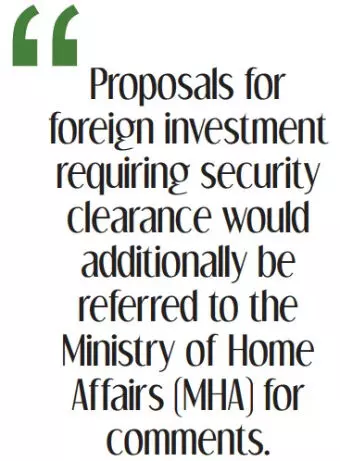- Home
- News
- Articles+
- Aerospace
- Artificial Intelligence
- Agriculture
- Alternate Dispute Resolution
- Arbitration & Mediation
- Banking and Finance
- Bankruptcy
- Book Review
- Bribery & Corruption
- Commercial Litigation
- Competition Law
- Conference Reports
- Consumer Products
- Contract
- Corporate Governance
- Corporate Law
- Covid-19
- Cryptocurrency
- Cybersecurity
- Data Protection
- Defence
- Digital Economy
- E-commerce
- Employment Law
- Energy and Natural Resources
- Entertainment and Sports Law
- Environmental Law
- Environmental, Social, and Governance
- Foreign Direct Investment
- Food and Beverage
- Gaming
- Health Care
- IBC Diaries
- In Focus
- Inclusion & Diversity
- Insurance Law
- Intellectual Property
- International Law
- IP & Tech Era
- Know the Law
- Labour Laws
- Law & Policy and Regulation
- Litigation
- Litigation Funding
- Manufacturing
- Mergers & Acquisitions
- NFTs
- Privacy
- Private Equity
- Project Finance
- Real Estate
- Risk and Compliance
- Student Corner
- Take On Board
- Tax
- Technology Media and Telecom
- Tributes
- Viewpoint
- Zoom In
- Law Firms
- In-House
- Rankings
- E-Magazine
- Legal Era TV
- Events
- Middle East
- Africa
- News
- Articles
- Aerospace
- Artificial Intelligence
- Agriculture
- Alternate Dispute Resolution
- Arbitration & Mediation
- Banking and Finance
- Bankruptcy
- Book Review
- Bribery & Corruption
- Commercial Litigation
- Competition Law
- Conference Reports
- Consumer Products
- Contract
- Corporate Governance
- Corporate Law
- Covid-19
- Cryptocurrency
- Cybersecurity
- Data Protection
- Defence
- Digital Economy
- E-commerce
- Employment Law
- Energy and Natural Resources
- Entertainment and Sports Law
- Environmental Law
- Environmental, Social, and Governance
- Foreign Direct Investment
- Food and Beverage
- Gaming
- Health Care
- IBC Diaries
- In Focus
- Inclusion & Diversity
- Insurance Law
- Intellectual Property
- International Law
- IP & Tech Era
- Know the Law
- Labour Laws
- Law & Policy and Regulation
- Litigation
- Litigation Funding
- Manufacturing
- Mergers & Acquisitions
- NFTs
- Privacy
- Private Equity
- Project Finance
- Real Estate
- Risk and Compliance
- Student Corner
- Take On Board
- Tax
- Technology Media and Telecom
- Tributes
- Viewpoint
- Zoom In
- Law Firms
- In-House
- Rankings
- E-Magazine
- Legal Era TV
- Events
- Middle East
- Africa

Highlights of the Standard Operating Procedure (SOP) for FDI Proposals
Highlights of the Standard Operating Procedure (SOP) for FDI Proposals

Highlights of the Standard Operating Procedure (SOP) for FDI Proposals The online and fast- track timelines for clearances for FDI proposals would smoothen the process, procedure and approval of foreign investments in India. The Department for Promotion of Industry & Internal Trade ("DPIIT") released the Standard Operating Procedure (SOP) dated 9th November, 2020), which highlights...
To Read the Full Story, Subscribe to Legal Era News
Access Exclusive Legal Era Stories, Editorial Insights, and Expert Opinion.
Already a subscriber? Sign in Now
Highlights of the Standard Operating Procedure (SOP) for FDI Proposals
The online and fast- track timelines for clearances for FDI proposals would smoothen the process, procedure and approval of foreign investments in India.
The Department for Promotion of Industry & Internal Trade ("DPIIT") released the Standard Operating Procedure (SOP) dated 9th November, 2020), which highlights the process and procedure for filing and processing of Foreign Direct Investment ("FDI") proposals, time limits and internal mechanisms for monitoring the processing of FDI proposals.
APPLICATION FILING
i. Online and physical filing proposals for foreign investment in sectors requiring Government approval as per the Consolidated FDI Policy dated 15.10.2020, as amended from time to time ("FDI Policy") and Foreign Exchange Management (Non-Debt Instrument) Rules, 2019 dated 17.10.2019, as amended from time to time ("FEM Rules") would be filed online through the Foreign Investment Facilitation Portal ("FIFP") along with the required documents provided in Annexure-1 of the SOP.

Once the application is digitally signed, the DPIIT will identify the concerned Administrative Ministry/Department (Competent Authority) and e-transfer the proposal within two (02) days to the concerned Competent Authority for processing and disposal of the case.
ii. Calculation of time limits: Time limits for disposal of applications will be calculated from the date of filing of the online application. However, where a physical copy is required to be filed and there is delay in making such filing, the time limit will be calculated from the date of filing of the physical application.
iii. Competent Authorities: The SOP provides the list of Competent Authorities for grant of Approval/Rejection of foreign investment proposals requiring Government approval. For instance, for the mining sector Department of Defence Production, Ministry of Defence, Broadcasting, Print Media and Digital Media Ministry of Information & Print Media and Digital Media Broadcasting.
iv. Documents: The list of documents that were required to be filed with FDI proposals FIPB portal in Annexure-1 of the SOP.
PROCEDURE FOR PROCESSING OF APPROVAL FOR FDI AND TIME LIMIT
The SOP envisages the following procedure for processing FDI applications:
i. Once the FDI proposal is filed on the FIFP, the DIPP will send the FDI proposal filed to the Reserve Bank of India (RBI) within 2 days for its comments from a FEMA perspective.
ii. Proposals for foreign investment requiring security clearance would additionally be referred to the Ministry of Home Affairs (MHA) for comments. Such proposals would be forwarded to the Ministry of External Affairs (MEA) for information. MEA may give their comments within the stipulated time period, wherever necessary. All comments will be given directly to the concerned Administrative Ministry/Department.
iii. The following proposals require security clearance from the MHA:
a. Investments in Broadcasting, Telecommunication, Satellites - establishment and operation, Private Security Agencies, Defense, Civil Aviation and Mining & mineral separation of titanium bearing minerals and ores, its value addition and integrated activities.
b. Investments/from an entity of a country which shares land border with India or where the beneficial owner of an investment into India is situated in or is a citizen of any such country. A citizen of Pakistan or an entity incorporated in Pakistan is allowed to invest, only under the Government route and is prohibited to invest in sectors/activities such as the Defense, space, atomic energy and sectors/activities.
iv. Specific issues of proposals requiring clarification from the point of view of FDI Policy may be referred to the DPIIT for clarification with the approval of Secretary of the concerned Competent Authority. The SOP envisages that consultation with the DIPP will only be carried out if necessary and not as a routine practice DPIIT is required to provide clarification within two (02) weeks on specific issues of FDI Policy as may be referred by the Competent Authority. If the Competent Authority needs to consult any other Ministry / Department, the Secretary of the Competent Authority is required to give full justification and approval for such consultation.

v. The concerned Ministries / Departments consulted on the proposal are required to upload their comments on the FIFP within 4 weeks from the date of receiving the proposal online, otherwise it will be presumed that they have no comments. Comments by MHA on proposals for investment in sectors requiring security clearance would be provided to the Competent Authority within six (06) weeks from the online receipt of such proposals. In cases where MHA is not in a position to provide its comments within six (06) weeks, it will intimate the concerned administrative Ministry/Department of the expected time frame within which MHA would be able to give its comments.
vi. The Competent Authority is required to scrutinize the proposal and documents and ask the applicant for relevant additional information/documents, if any, within one week. In order to avoid delay all such queries are required to be made online/emailed to the applicant. If no clarifications to the queries are received within one (01) week, the Competent Authority is required to expedite their clarifications within the next seven (07) days, failing which a final reminder may be issued to the applicant to provide the information in seven (07) days before closing the application due to incomplete/inadequate information/documents from the applicant. Time taken by the applicant in addressing the queries raised by the Competent Authority will be excluded from the time limits for disposal of proposal.
vii. The Competent Authority is required to take into consideration the FDI Policy, Press Notes, FEMA/RBI Notifications/Guidelines issued from time to time., sectoral requirements and the sectoral policies vis-à-vis the proposals, while examining the proposals.
viii. Once the proposal is complete in all respects, which should not be later than six weeks/eight weeks (in cases where comments of MHA have been sought from security clearance point of view) from the receipt of the proposal, the Competent Authority is required to within the next four (04) weeks, process the proposal for decision and convey the same to the applicant. The approval/ rejection letters will be sent online by the Competent Authority to the applicant, consulted Ministries/Departments and DPIIT.

ix. Proposals involving total foreign equity inflow of more than ₹5000 crore, are required to be placed for consideration of Cabinet Committee on Economic Affairs (CCEA) within the above timelines. After the receipt of the decision of CCEA, approval letter is required to be issued within 1 week.
x. Proposals which are sought to be rejected by the Competent Authority or where additional conditions for approval are stipulated require the concurrence of DIPP within 10 weeks/12 weeks, as the case maybe from the receipt of the proposal. The DIPP has been granted an additional time of 2 weeks to consider the proposals which are proposed to be rejected or where additional conditions are proposed to be imposed by the Competent Authority.
xi. Secretary of the DPIIT is the competent authority for decision on cases referred by other Administrative Ministries/Departments, seeking concurrence of DPIIT for rejection of the proposal/ stipulation of additional conditions in approval letter.
xii. Approval letters are required to be issued by the Competent Authority in the format prescribed at Annexure-2 to the SOP.
TIME LIMITS
The SOPs provide the time limits for the various action points involved in processing an application for FDI approval. Further, it has been stated that an additional time of 2 weeks will be given for proposals considered for rejection or bearing conditions not provided in the FDI Policy. Time limits allocated do not include the time taken by applicants in removing deficiencies in the proposals/supplying additional information that may be required by the Competent Authority.
MONITORING & REVIEW
The SOP envisages the following internal mechanisms for monitoring the processing of FDI proposals:
i. Competent Authorities are required to convene regular monthly reviews on the foreign investment proposals pending with them.
ii. The Secretary, DIPP shall convene quarterly review meetings on pending proposals with the Government periodically every four (04) to six (06) weeks which may also be attended by the Secretary of the concerned Competent Authority.
iii. Competent Authorities are required to update the information regarding date of physical receipt of the application and update the decisions taken on the portal.
iv. Competent Authorities are required to furnish a fortnightly report on pending proposals and maintain an updated database of all proposals dealt by them.
COMMENTS
The online and fast-track timelines for clearances for FDI proposals would smoothen the process, procedure and approval of foreign investments in India. The focus remaining with a specific group within Competent Authorities would definitely save time for clearances and approval of FDI proposals. However, the question does arise whether the Competent Authorities (and the specific groups within) will have the necessary expertise to consider the various concerns that arise in foreign investment proposals. It is also yet to be seen whether the various authorities will be able to work in efficient conjunction with one another.
Disclaimer – The views expressed in this article are the personal views of the authors and are purely informative in nature.


